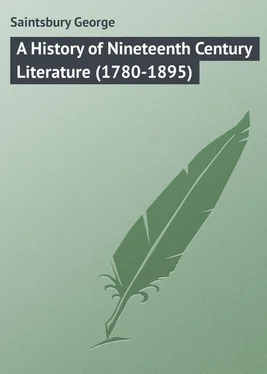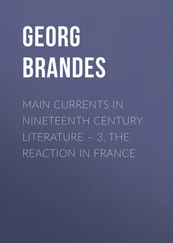George Saintsbury - A History of Nineteenth Century Literature (1780-1895)
Здесь есть возможность читать онлайн «George Saintsbury - A History of Nineteenth Century Literature (1780-1895)» — ознакомительный отрывок электронной книги совершенно бесплатно, а после прочтения отрывка купить полную версию. В некоторых случаях можно слушать аудио, скачать через торрент в формате fb2 и присутствует краткое содержание. ISBN: , Жанр: foreign_prose, на английском языке. Описание произведения, (предисловие) а так же отзывы посетителей доступны на портале библиотеки ЛибКат.
- Название:A History of Nineteenth Century Literature (1780-1895)
- Автор:
- Жанр:
- Год:неизвестен
- ISBN:http://www.gutenberg.org/ebooks/31698
- Рейтинг книги:5 / 5. Голосов: 1
-
Избранное:Добавить в избранное
- Отзывы:
-
Ваша оценка:
- 100
- 1
- 2
- 3
- 4
- 5
A History of Nineteenth Century Literature (1780-1895): краткое содержание, описание и аннотация
Предлагаем к чтению аннотацию, описание, краткое содержание или предисловие (зависит от того, что написал сам автор книги «A History of Nineteenth Century Literature (1780-1895)»). Если вы не нашли необходимую информацию о книге — напишите в комментариях, мы постараемся отыскать её.
A History of Nineteenth Century Literature (1780-1895) — читать онлайн ознакомительный отрывок
Ниже представлен текст книги, разбитый по страницам. Система сохранения места последней прочитанной страницы, позволяет с удобством читать онлайн бесплатно книгу «A History of Nineteenth Century Literature (1780-1895)», без необходимости каждый раз заново искать на чём Вы остановились. Поставьте закладку, и сможете в любой момент перейти на страницу, на которой закончили чтение.
Интервал:
Закладка:
Burns' work, which even in bulk – its least remarkable characteristic – is very considerable when his short life and his unfavourable education and circumstances are reckoned, falls at once into three sharply contrasted sections. There are his poems in Scots; there are the verses that, in obedience partly to the incompetent criticism of his time, partly to a very natural mistake of ambition and ignorance, he tried to write in conventional literary English; and there is his prose, taking the form of more or less studied letters. The second class of the poems is almost worthless, and fortunately it is not bulky. The letters are of unequal value, and have been variously estimated. They show indeed that, like almost all poets, he might, if choice and fate had united, have become a very considerable prose-writer, and they have immense autobiographic value. But they are sometimes, and perhaps often, written as much in falsetto as the division of verse just ruled out; their artificiality does not take very good models; and their literary attraction is altogether second-rate. How far different the value of the Scots poems is, four generations have on the whole securely agreed. The moral discomfort of Principal Shairp, the academic distaste of Mr. Matthew Arnold for a world of "Scotch wit, Scotch religion, and Scotch drink," and the purely indolent and ignorant reluctance of others to grapple with Scottish dialect, need not trouble the catholic critic much. The two first may be of some use as cautions and drags; the third may be thrown aside at once. Scots, though a dialect, is not a patois; it has a great and continuous literature; it combines in an extraordinary degree the consonant virtues of English and the vowel range of the Latin tongues. It is true that Burns' range of subject, as distinct from that of sound, was not extremely wide. He could give a voice to passion – passion of war, passion of conviviality, passion above all of love – as none but the very greatest poets ever have given or will give it; he had also an extraordinary command of genre -painting of all kinds, ranging from the merely descriptive and observant to the most intensely satirical. Perhaps he could only do these two things – could not be (as he certainly has not been) philosophical, deeply meditative, elaborately in command of the great possibilities of nature, political, moral, argumentative. But what an "only" have we here! It amounts to this, that Burns could "only" seize, could "only" convey the charms of poetical expression to, the more primitive thought and feeling of the natural man, and that he could do this supremely. His ideas are – to use the rough old Lockian division – ideas of sensation, not of reflection; and when he goes beyond them he is sensible, healthy, respectable, but not deep or high. In his own range there are few depths or heights to which he has not soared or plunged.
That he owed a good deal to his own Scottish predecessors, especially to Ferguson, is not now denied; and his methods of composing his songs are very different from those which a lesser man, using more academic forms, could venture upon without the certainty of the charge of plagiarism. We shall never understand Burns aright if we do not grasp the fact that he was a "folk-poet," into whom the soul of a poet of all time and all space had entered. In all times and countries where folk-poetry has a genuine existence, its forms and expressions are much less the property of the individual than of the race. The business of collecting ballads is one of the most difficult and doubtful, not to say dangerous, open to the amateur. But it is certain that any collector who was not a mere simpleton would at once reject as spurious a version which he heard in identically the same terms from two different subjects. He would know that they must have got it from a printed or at least written source. Now Burns is, if not our only example, our only example of the very first quality, of the poet who takes existing work and hands it on shaped to his own fashion. Not that he was not perfectly competent to do without any existing canvas; while, when he had it, he treated it without the very slightest punctilio. Of some of the songs which he reshaped into masterpieces for Johnson and Thomson he took no more than the air and measure; of others only the refrain or the first few lines; of others again stanzas or parts of stanzas. But everywhere he has stamped the version with something of his own – something thenceforward inseparable from it, and yet characteristic of him. In the expression of the triumph and despair of love, not sicklied over with any thought as in most modern poets, only Catullus and Sappho can touch Burns. "Green grow the Rashes O," "Yestreen I had a Pint of Wine," the farewell to Clarinda, and the famous death-bed verses to Jessie Lewars, make any advance on them impossible in point of spontaneous and unreflecting emotion; while a thousand others (the number is hardly rhetorical) come but little behind. "Willie brew'd a Peck o' Maut" in the same way rides sovereign at the head of a troop of Bacchanalian verses; and the touches of rhetoric and convention in "Scots wha hae" cannot spoil, can hardly even injure it. To some it really seems that the much praised lines "To Mary in Heaven" and others where the mood is less boisterous, show Burns at less advantage, not because the kind is inferior, but because he was less at home in it; but it is almost impossible to praise too highly the equally famous "Mouse," and some other things. It was in this tremendous force of natural passion and affection, and in his simple observation of common things, that Burns' great lesson for his age and country lay. None even of the reformers had dared to be passionate as yet. In Cowper indeed there was no passion except of religious despair, in Crabbe none except that of a grim contemplation of the miseries and disappointments of life, while although there was plenty of passion in Blake it had all conveyed itself into the channel of mystical dreaming. It is a little pathetic, and more than a little curious, to compare "The Star that shines on Anna's Breast," the one approach to passionate expression of Cowper's one decided love, with any one of a hundred outbursts of Burns, sometimes to the very same name.
The other division of the Poems, at the head of which stand The Jolly Beggars , Tam o' Shanter , and The Holy Fair , exhibit an equal power of vivid feeling and expression with a greater creative and observant faculty, and were almost equally important as a corrective and alterative to their generation. The age was not ill either at drama, at manners-painting, or at satire; but the special kind of dramatic, pictorial, and satiric presentation which Burns manifested was quite unfamiliar to it and in direct contradiction to its habits and crotchets. It had had a tendency to look only at upper and middle-class life, to be conventional in its very indecorum, to be ironic, indirect, parabolical. It admired the Dutch painters, it had dabbled in the occult, it was Voltairian enough; but it had never dared to outvie Teniers and Steen as in The Jolly Beggars , to blend naturalism and diablerie with the overwhelming verve of Tam o' Shanter , to change the jejune freethinking of two generations into an outspoken and particular attack on personal hypocrisy in religion as in Holy Willie's Prayer and The Holy Fair . Even to Scotsmen, we may suspect (or rather we pretty well know, from the way in which Robertson and Blair, Hume and Mackenzie, write), this burst of genial racy humour from the terræ filius of Kilmarnock must have been somewhat startling; and it speaks volumes for the amiable author of the Man of Feeling that, in the very periodical where he was wont to air his mild Addisonian hobbies, he should have warmly commended the Ayrshire ploughman.
Читать дальшеИнтервал:
Закладка:
Похожие книги на «A History of Nineteenth Century Literature (1780-1895)»
Представляем Вашему вниманию похожие книги на «A History of Nineteenth Century Literature (1780-1895)» списком для выбора. Мы отобрали схожую по названию и смыслу литературу в надежде предоставить читателям больше вариантов отыскать новые, интересные, ещё непрочитанные произведения.
Обсуждение, отзывы о книге «A History of Nineteenth Century Literature (1780-1895)» и просто собственные мнения читателей. Оставьте ваши комментарии, напишите, что Вы думаете о произведении, его смысле или главных героях. Укажите что конкретно понравилось, а что нет, и почему Вы так считаете.












